2021
71st Berlin International Film Festival
Industry Event, March 1–5, 2021
Summer Special, June 9–20, 2021
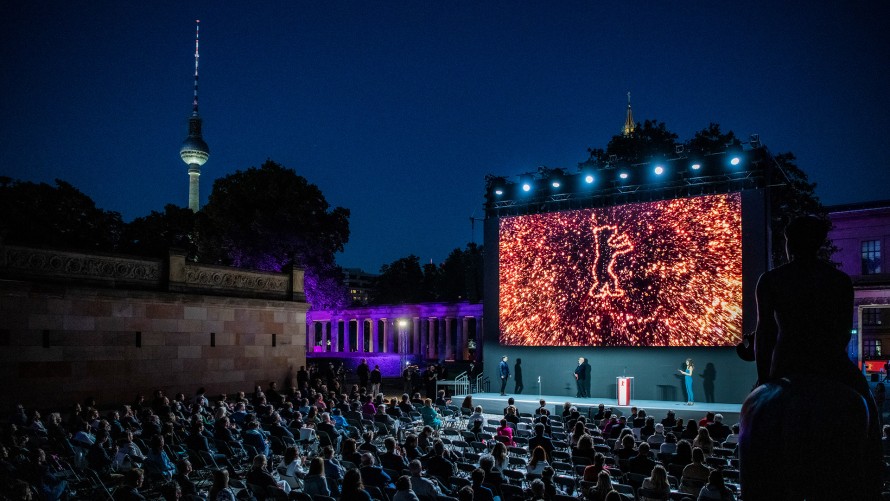
Best of Berlinale Summer Special 2021
"That an online festival wasn’t an option for Mariette Rissenbeek and Carlo Chatrian and they didn’t forsake the big screen in 2021 – even though it would have been a lot easier – is now paying off. It was a bet against the pandemic and the prospective winner was unclear. It was made not only thanks to a love of cinema but also because of the Berlinale organisers’ appreciation of the loyal Berlin cineastes. This festival is for them."
Susanne Lenz, “Berliner Zeitung”, June 5, 2021
In the beginning was the virus. COVID, corona, Covid-19, SARS-CoV-2. It infected everything. Not only people’s bodies, throats and lungs, but also their thoughts, perceptions, fears, hopes and desires in a world attacked by an insidious respiratory disease. For the Berlinale, too, this meant spending a year in a permanent state of emergency during which nothing would turn out as expected. What had already emerged as an ominous premonition during the 2020 Berlinale became the template for a new normal with alarming speed: in March 2020, just a few days after the 70th Berlinale ended, the German Federal Government decreed a first lockdown and the streets of Berlin became deserted. Public life and various sectors of the economy ground to a halt, the country came to an almost complete standstill. Case numbers were studied as assiduously as share prices, the media landscape monothematically focused on this single, all-dominating topic. The R number, the indication of how many people are infected by an infected person, became the omniscient oracle of the individual and collective future. The virus, invisible to the human eye, had conquered the world within a matter of weeks. Only its consequences were visible – captured drastically, for example, in the image of a convoy of coffin-bearing trucks transporting the bodies of the victims from Bergamo, Italy, after the local crematoria were simply overburdened by their task. Fear spread. Of an infection, of the exponential growth in case numbers, of intensive care units being overcrowded. The borders were shut and isolationism was the order of the day for nation states, travelling became out of the question. Virologists became opinion leaders, hardly any political decisions were made without consultations with scientists who sometimes rose to pop-star status but who also faced wide-ranging hostility.
New Rules
As a specifically social infrastructure, the cinema was hit by the full force of the virus. Spending time in an indoor space became a safety hazard and was therefore prohibited during the lockdowns; contact with other people became subject to the rules of social distancing. The film theatres were closed, the idea of cinema as a place of shared experience lay dormant while the individual, isolated consumption of audio-visual images in front of the home screen boomed. The number of users of streaming services went through the roof while artists offered live streams from their living rooms so as not to completely lose contact with their audiences.
The situation eased in the early summer of 2020 and the old normality seemed to be yet again within reach. But in autumn, the virus returned with full intensity in a second and then a third wave. Another lockdown, another closure of the cinemas, another standstill. Another round of soothsaying with the virologists about how the virus situation would develop in the coming weeks. Politicians drew up new rules for public life and just as quickly discarded them – and they varied from federal state to federal state. Something permitted in Berlin could lead to a fine just a few metres away in Brandenburg. The regulations sometimes became so complex that barely anyone understood them. And in the midst of all this uncertainty, the Berlinale directors faced the almost impossible task of planning an international festival. When asked in February about the greatest challenge of the last few months, Mariette Rissenbeek replied: “Everything is so unpredictable. A pandemic evolves in a very dynamic way and what’s possible today is not possible tomorrow. That makes it very difficult to plan an event like the Berlinale. We feel so committed to showing the films to the Berlin audience and feel committed to working with cinemas, and these two elements are the most unpredictable so that makes it a big challenge” (in an interview with Michael Rosser, “Screendaily”, February 25, 2021).
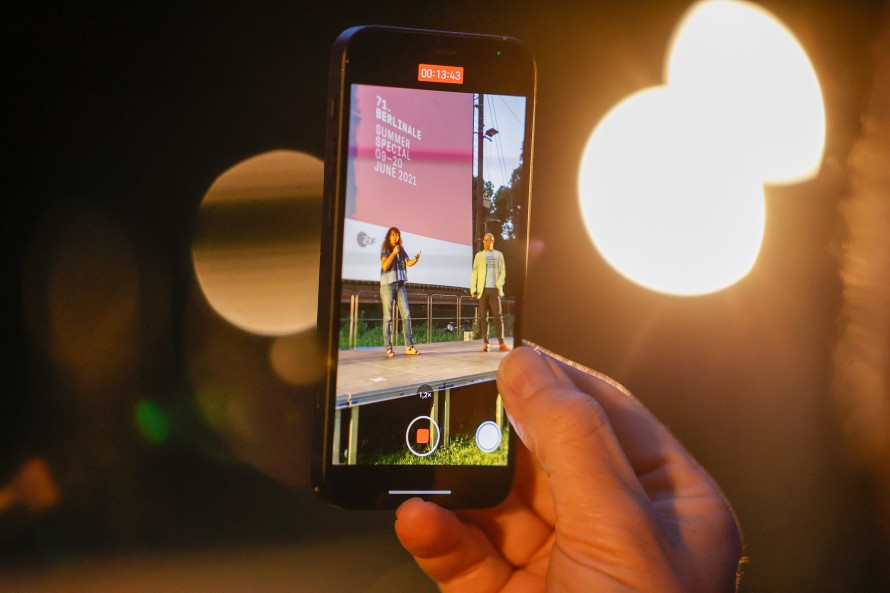
Digital or physical - that was the big question
From the start, the festival directors adhered to a clear, decisive and unswerving philosophy: film festivals are places of direct contact and personal encounters, of shared experiences – especially the Berlinale which is one of the largest public festivals in the world. Remove these aspects and you remove its essence. As Carlo Chatrian emphasised in an interview with David Mouriquand: “The collective experience is something we consider to be essential” (“Exberliner”, February 4, 2021).
The 71st Berlinale – A Festival in Two Stages
In late August 2020, an initial plan for the 71st Berlinale was announced: the festival would be held in a physical form as usual while the European Film Market would be a hybrid version of both physical and digital events. But what 2020 demanded above all from event organisers was flexibility: the ability to review and adapt decisions in the face of the constantly changing infection situation. When the second wave of Covid-19 quickly and violently hit in the autumn, it became clear that it would be impossible to hold the upcoming edition of the festival in the form decided upon in August. New plans and concepts were drawn up and discarded, including the consideration of postponing the festival to April. On December 18, 2020 the final decision was announced: for the first time in its history, the Berlinale would take place in two stages, with a digital Industry Event held in early March for the industry and a Summer Special in June for the general public. Thus, the festival directors accommodated the varying interests and requirements: “The Berlinale has two important components: on the one hand, there is the audience who want to experience the stars and directors up close. On the other, there is the film industry which trades in films, rights and ideas. We are now dividing these pillars in two” (Mariette Rissenbeek in an interview with Stefan Stosch, “Redaktionsnetzwerk Deutschland”, January 1, 2021).
This decision took a lot of courage. In December 2020, the German vaccination campaign with its promises of relief and security was at best a vague hope; the governing parties had lost a great amount of public trust in the previous months due to various over-hasty decisions, delays, corruption scandals and wrong turns. Nobody could predict what would be possible and permitted in March, never mind June. The cancellation of festivals or transferring them entirely to the digital realm had become the rule. The Sundance Film Festival, for example, took place in digital form at the end of January 2021. The risks and uncertainties of the next few days and weeks seemed too great.
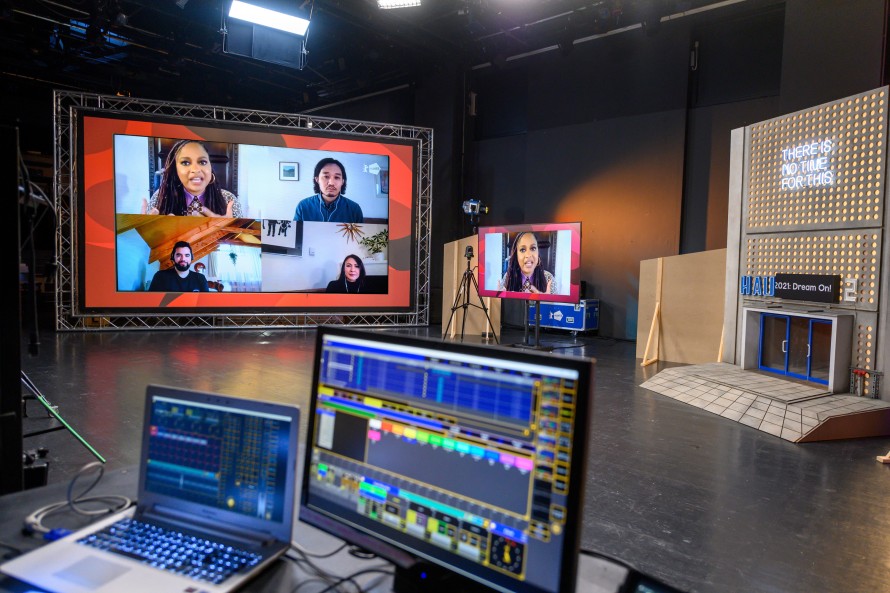
At the set of one of the Berlinale Talents digital talks in the HAU Hebbel am Ufer
The Berlinale Industry Event
From March 1 to 5, 2021, the Industry Event launched the 71st Berlinale with purely digital editions of the European Film Market, the Berlinale Co-Production Market, Berlinale Talents and the World Cinema Fund. Preparations were intense, especially since the digital infrastructure for such an event first had to be created. The Berlinale audience was initially excluded, although the press were given the opportunity to view the films online and to review them – providing an important impetus for the filmmakers and their works: “Films that don’t appear at festivals and maybe win awards there receive less attention from audiences. The way to the big screen is harder for them. It’s possible that they will never truly come to life,” explained Mariette Rissenbeek of the decision (in an interview with Stefan Stosch, “Redaktionsnetzwerk Deutschland”, January 11, 2021). Participation in the various sections of the festival – a seal of approval for every film – was to be maintained, with media attention given to the invited works to support their marketing. The strategy worked, as Barbara Schuster summed up in “Blickpunkt:Film”: “An unusual experiment which was, however, judging by the reactions of the German buyers and sellers, a total success” (March 25, 2021). As John Hopewell and Elsa Keslassy reported in “Variety”: “Berlin’s virtual 2021 European Film Market, many companies feared, would be an underwhelming affair. Wrapping today, at least officially, the online event built over this week to finally give cause for much needed optimism” (March 5, 2021).
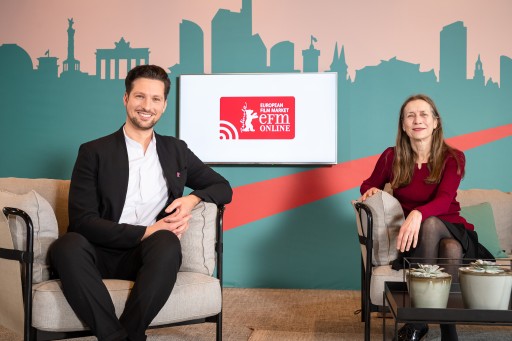
Dennis Ruh, Leiter des European Film Market, mit Mariette Rissenbeek, Geschäftsführerin der Berlinale
Thus, the first digital European Film Market became a resounding success – not least for its newly minted head Dennis Ruh who took over the position from Matthijs Wouter Knol in the summer after the latter moved to the European Film Academy.
And there was also a lot for the general audience to discover: with the title of “Dream On!”, Berlinale Talents made the majority of its events publicly accessible by streaming them online. "Decolonizing Cinema" was the central topic of the public online event of the World Cinema Fund. And in the specially set up Berlinale studio, numerous interviews were held with the filmmakers of the 2021 edition which could also be accessed on demand.
Film Selection and Awards
The virus also had an influence on the programme. One difficulty was the travel restrictions which largely forced the section heads and programmers to remain in Berlin rather than scouting for films all over the world as usual. At the end of an unusual selection process, all the sections were represented, albeit in a reduced form. Carlo Chatrian took the task of gently breaking the news of the painful cuts to the section heads: “I had to play the bad cop to my colleagues. From last summer, it was clear the 2021 line-up would be reduced. We then had to change our formula [to online-only] and the reduction had to be more drastic for some sections” (in an interview with Michael Rosser, “Screendaily”, February 25, 2021). The decreased number of works did not have a negative impact on quality, however. Quite the reverse: the programme was widely celebrated both nationally and internationally as one of the strongest in recent years. As Jonathan Romney summed up euphorically in the “Guardian”: “the most impressive selection in years” (March 6, 2021). “Particulièrement riche” (Luc Chessel, Elisabeth Franck-Dumas, “Libération”, March 7, 2021); “überzeugend” (Tim Caspar Boehme, “taz”, March 8, 2021); “stellar” (Jessica Kiang, “The New York Times”, March 5, 2021) – the praise-filled media response to the film selection.
Alongside the summaries came reflections on the special situation in which the films were being viewed and assessed. Journalists repeatedly discussed the drawback of this being solely an online industry event: “What this Berlinale most painfully missed was everyone else: the people who sit in the cinema and moan, yawn, laugh and, in the best case scenario, fall silent at the more intense moments. They are the ones who give the films a sounding board and remind cinemagoers time and again that watching films is not just a matter of simply looking – it is always the beginning of a conversation” wrote Claudius Seidl on March 6, 2021 in the “FAZ”. What was missing were the imperfections, the frictions and disturbances in the auditorium: “At some point, I realized: It’s no longer even the sociability of the theatrical experience that I long for; it’s simply the interference. I miss the dust in the projector beam. I miss the tiny tactile imperfections of being in a public place that remind you there’s a world outside the film and your own echo-box brain. Without them, everything is too clean” (Jessica Kiang, “The New York Times”, March 5, 2021).
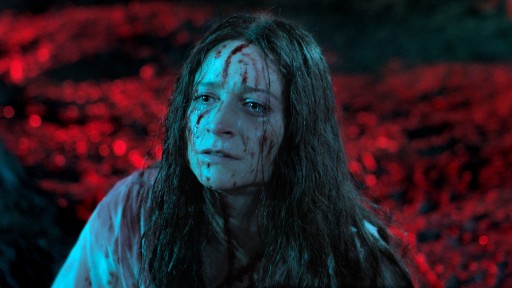
Censor by Prano Bailey-Bond
The world and our perception of it had changed. Contacts with the outside world became increasingly virtual and lost their material quality. Prano Bailey-Bond’s Panorama film Censor, in which the protagonist increasingly loses herself in the visual worlds of the B-horror movie until she can no longer differentiate between the virtual and the physical present, suddenly acquired a frightening sense of urgency and topicality.
The question that was still pressing in the summer of 2020 of whether there would be enough films to deliver a full programme quickly became redundant. More films than usual were submitted: films that were completed shortly before the start of the pandemic or ones made during the course of it. Celine Sciamma’s Competition entry Petite Maman, for example, clearly betrayed the circumstances of its production. This French film feels like a chamber piece with its extreme reduction in terms of locations and characters – and yet it still works wonderfully: “Making these two characters vulnerable and delicate children is an artistic masterstroke on Sciamma’s part. What a superb movie – a jewel of this year’s Berlin film festival” wrote Peter Bradshaw on March 3, 2021 in the “Guardian”. And Sciamma was not the only one to rise to the challenges of a new era and triumph aesthetically. The impact of the virus was most evident in the filming of Radu Jude’s Babardeală cu bucluc sau porno balamuc (Bad Luck Banging or Loony Porn) which won the Golden Bear. In it, the characters wear masks, the overriding symbol of the new era.
In most of the other films, Covid-19 did not play a big role, at least not on the surface. And yet the virus was present in every image because the audience’s changed perception became an arena for reflection about what the coronavirus had done to the minds of our societies. As Carlo Chatrian explained: “My colleagues on the selection committee and I – we received the impression that the films contain a sense of insecurity, anxiety and fear. I then asked myself whether it was really in the films or more in my head” (in an interview with Susanne Burg, “Deutschlandfunk Kultur”, February 13, 2021). The infected perception became particularly evident in a film such as Maria Speth’s long-term documentary Herr Bachmann und seine Klasse (Mr Bachmann and His Class). The film “just” shows the everyday school life of an extraordinary teacher – and yet, after months of contact restrictions and home schooling, the images felt like they were decades away, strange, unreal and out of time. Maria Speth’s quiet observation also convinced the International Jury – which, in 2021, was composed of six directors of Golden Bear-winning films from previous years – and won the Silver Bear Jury Prize. This was an award that had not previously existed: after the revelations about the festival’s first director and his involvement in the Nazi regime which had caused a stir in the previous year, the Silver Bear Alfred Bauer Prize bearing his name was suspended in 2020 and the Silver Bear Jury Prize introduced in its stead in 2021. Another new feature in 2021 was the gender-neutral acting awards: a concrete outcome of the increasingly heated debates on identity politics. Both prizes went to women: Maren Eggert won the Silver Bear for Best Leading Performance for her work in Ich bin dein Mensch (I’m Your Man) directed by Maria Schrader while Lilla Kizlinger won the Silver Bear for Best Supporting Performance in Rengeteg – mindenhol látlak (Forest – I See You Everywhere) directed by Bence Fliegauf.
Just how little films are affected by travel restrictions and national borders could be seen in the geographical diversity of the other winners. Asia featured twice: the Japanese film Guzen to sozo (Wheel of Fortune and Fantasy) by Ryusuke Hamaguchi won the Silver Bear Grand Jury Prize while Hong Sansoo’s Inteurodeoksyeon (Introduction) from the Republic of Korea won the Silver Bear for Best Screenplay. The Silver Bear for Outstanding Artistic Contribution went to Mexico, to Yibrán Asuad, the editor of Alonso Ruizpalacios’ Una película de policías (A Cop Movie) while the Hungarian Dénes Nagy was awarded Best Director for Természetes fény (Natural Light).
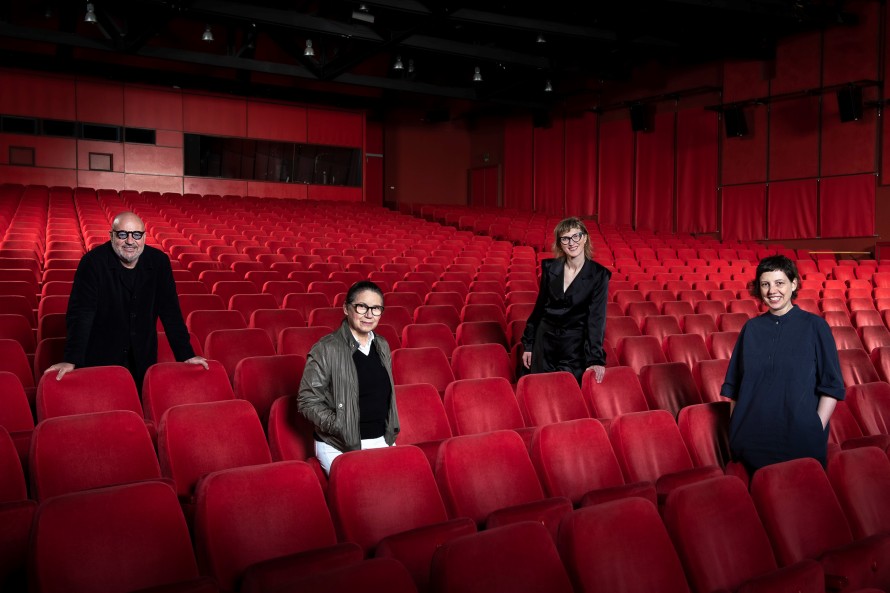
Gianfranco Rosi, Ildikó Enyedi, Jasmila Žbanić and Adina Pintilie are a third of the International Jury; Nadav Lapid and Mohammad Rasoulof each viewed the films at home.
The Golden and Silver Bears and most of the other prizes were announced during the Industry Event. The juries had been given the opportunity to view the films on the big screen in Berlin – with the rules for business travel being different to those for tourism. The only jury members not present were Nadav Lapid (Synonymes, 2019 Golden Bear), who unfortunately received a special permit concerning the pandemic-related travel restrictions too late, and Mohammad Rasoulof (Sheytan vojud nadarad, 2020 Golden Bear), who continued to be subject to his travel ban issued by the Iranian government. Since the winners were not permitted to come to Berlin in March, they learned of their triumph virtually. Nevertheless, their joy was clearly transmitted in thank-you messages and reaction-shot videos which showed them receiving the happy news.
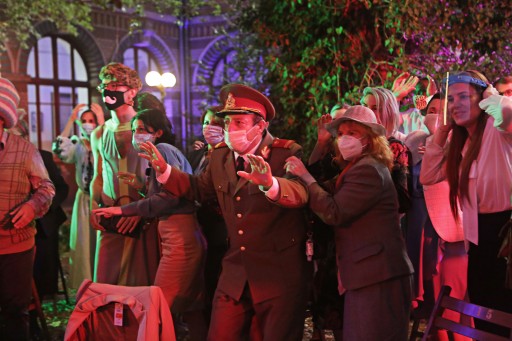
Babardeală cu bucluc sau porno balamuc (Bad Luck Banging or Loony Porn) by Radu Jude
The jury’s decisions met with a positive response, with Babardeală cu bucluc sau porno balamuc being a particularly worthy award winner in the eyes of many critics: “Berlinale winners have repeatedly been praised for the fact that their relevance and sense of urgency graces this most political of all major film festivals. 'Bad Luck Banging or Loony Porn' simultaneously confirms and breaks this rule by capturing the zeitgeist and repudiating it. The film does not seek to please but nevertheless is the most fun Golden Bear winner in a long time” (Hannah Pilarczyk, “Der Spiegel”, March 5, 2021).
As the Industry Event drew to a close, the excitement about the festival being extended into the summer could already be felt. “The cinemas and direct exchanges were sorely missed, but the programme was stronger than it had been for years. Now we can only hope that the Berlinale for the public can actually take place in June, whether in open-air or indoor cinemas. In any case, there are plenty of films that are worth seeing” wrote Thomas Abeltshauser in “Freitag” (issue 10/2021). Andreas Busche in the “Tagesspiegel” succinctly added: “Berlin can look forward to a great cinema summer” (March 5, 2021).
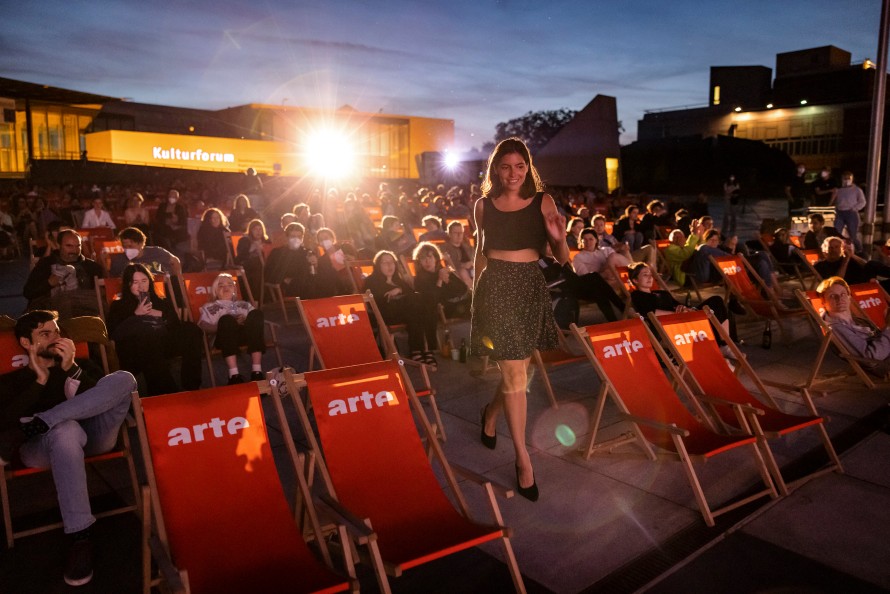
Director Jacqueline Lentzou during the screening of her film Moon, 66 Questions at the Kulturforum
The Summer Special
Once again, the cycle of hope and fear began, the incessant waiting for signs in a quantified world whose expressions of feasibility had changed: the focus had shifted from the R number to the 7-day incidence rate which indicated how many people had been infected per 100,000 inhabitants within the last seven days. In April, the government introduced the “Federal Emergency Brake” to take control of the patchwork of openings and closings that had developed over time in the various federal states. A 7-day incidence of 100-plus brought in stricter rules such a curfew coming into effect which meant a film festival in physical form would then be out of the question. And once again, the festival directors showed great courage. On May 10 – with the incidence rate still over 100 – the decision was announced that the Summer Special would take place as a purely open-air event at 16 locations across Berlin. In a situation in which the film theatres had been shuttered for months, the festival directors wanted to signal the go-ahead for the restart of cinema and culture in general: “With this, we want to strengthen cinema. The pandemic has led to an increase in streaming and the cinemas have been closed for a long time. It’s very important for us to show that we believe in the big screen and in the cinema as a place for shared experiences” (Mariette Rissenbeek in an interview with Susanne Lenz, “Berliner Zeitung”, October 6, 2020). The determination and steadfastness of the festival directors’ desire to signal the rebirth of cinema culture and give audiences the opportunity to enjoy film on the big screen is only emphasised by the fact that these words date from October 2020. Almost eight months later, they would now become a reality. And the cinema did indeed need a fresh start: in addition to bringing a new set of challenges, the pandemic exacerbated and accelerated the already pressing crisis cinema was facing. The big American distributors were increasingly overriding the exclusive exploitation window enjoyed by film theatres and releasing their films directly onto the streaming platforms. For the first time, in 2021 the Academy Awards permitted works without a theatrical release – another consequence of the pandemic.
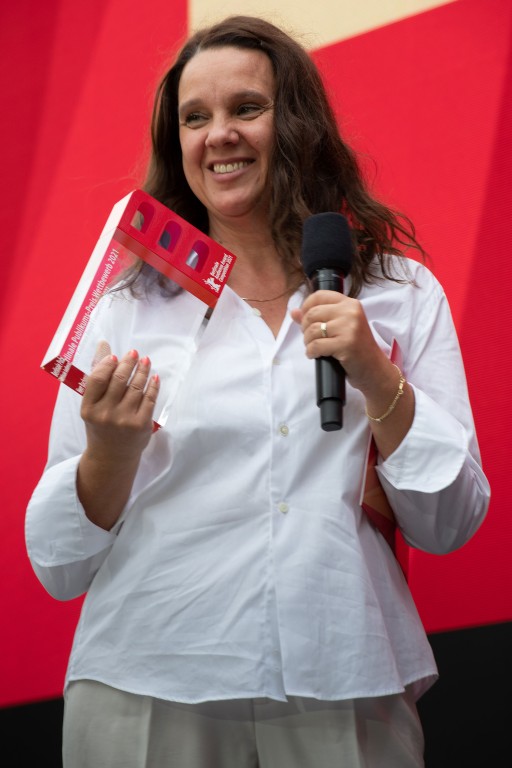
The director Maria Speth with the Berlinale Competition Audience Award which she received for Herr Bachmann und seine Klasse
Berlin audiences would now be able to see a large part of March’s film selection in the open-air cinemas. The exception was the "No Angels – Mae West, Rosalind Russell & Carole Lombard“ Retrospective whose works would have to be screened primarily on traditional film material. Apart from the foretaste of Wesley Ruggles’ I’m No Angel (USA, 1933) with Mae West in the lead role, the Retrospective programme was postponed to 2022 since it was not possible to screen film prints in the open-air cinemas. The Forum Expanded exhibition, scheduled for May 2021, was also postponed for a year. As a special gesture of acknowledgement to the audience in this extraordinary year, the one-off Berlinale Competition Audience Award was offered so that the spectators could choose their own favourites among the 15 films in the 2021 Competition. On the last day of the Summer Special, Maria Speth’s Herr Bachmann und seine Klasse (Mr Bachmann and His Class) – a film that so intensely portrays a life before and without Corona – was announced as the winner.
And Berlin came back to life. The number of Covid-19 cases slowly but surely fell, the streets and restaurant patios filled up and, by the time the ticket sales started, it had become clear just how great the audience’s hunger was for new films and shared experiences. The screenings very quickly sold out and ultimately more than 92 percent of seats were filled. Of course, nothing was like it used to be, but the audience took this in their stride. The Summer Special was only made possible by being a pilot project of the Berlin Senate with compulsory testing and a comprehensive safety and hygiene policy. Minimum social distances had to be observed and people were obliged to wear masks apart from when they were seated. Due to the pandemic, the open-air cinema on Museum Island, created especially for the Summer Special, offered a uniquely organised red carpet. Only a few photographers and video crews were permitted and the festival buzz was reduced to a minimum. And yet, insofar as travel was again possible, the casts and crews of the films came in large numbers to present their work before an audience. On the evening of the award ceremony, almost all the winners were present to finally receive their prizes in person. Open-air cinemas both small and large developed their own unique charm – from the imposing backdrop at the Kulturforum to the raccoons at the Rehberge which scaled the open-air cinema’s perimeter fence in the evening in order to finally experience the Berlinale themselves.
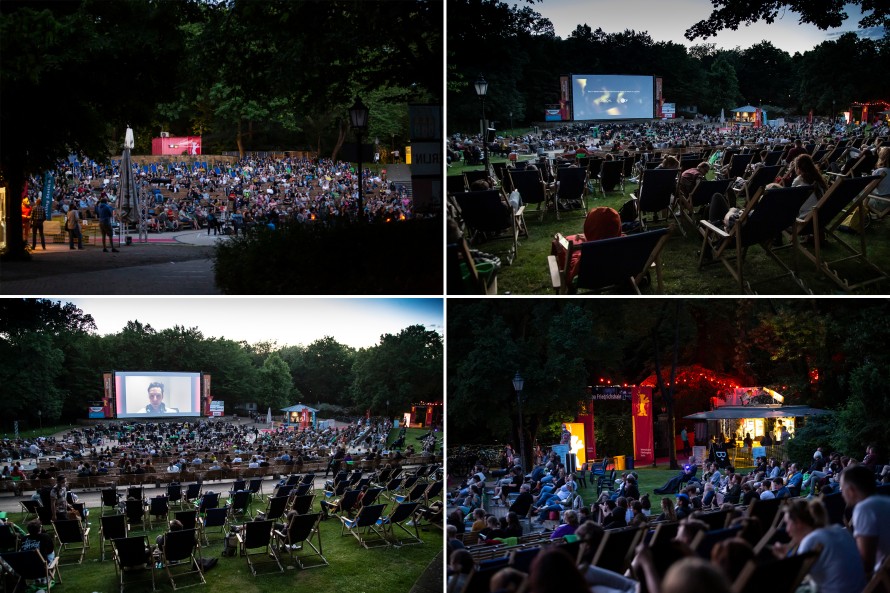
Open air cinema under the starry sky
The weather, with a few exceptions, was clement and so Berlin and its audiences were able to celebrate an open-air festival of cinema that recalled the Berlinale of the distant past, when the festival was still held in summer on a regular basis. “No parties or receptions, no freezing in the icy February wind on Potsdamer Platz, no queueing for tickets in the mornings. Instead, summer flair under a starry sky, casual clothes and deckchairs. Even smoking was permitted. The mood during these days was relaxed, there was a sense of relief. And it was an important signal for the film industry which, with Covid-19, is undergoing the greatest crisis in its history” is how Thomas Abeltshauser summed up his impressions (“Freitag”, issue 24/2021). And as Robert Ide poetically declared in the “Tagesspiegel” as the Summer Special drew to a close: “How now, over already? It could have gone on like this forever. A film made of films lies softly on the skin of the city. The Berlinale, a Midsummer Night’s Dream” (June 19, 2021).
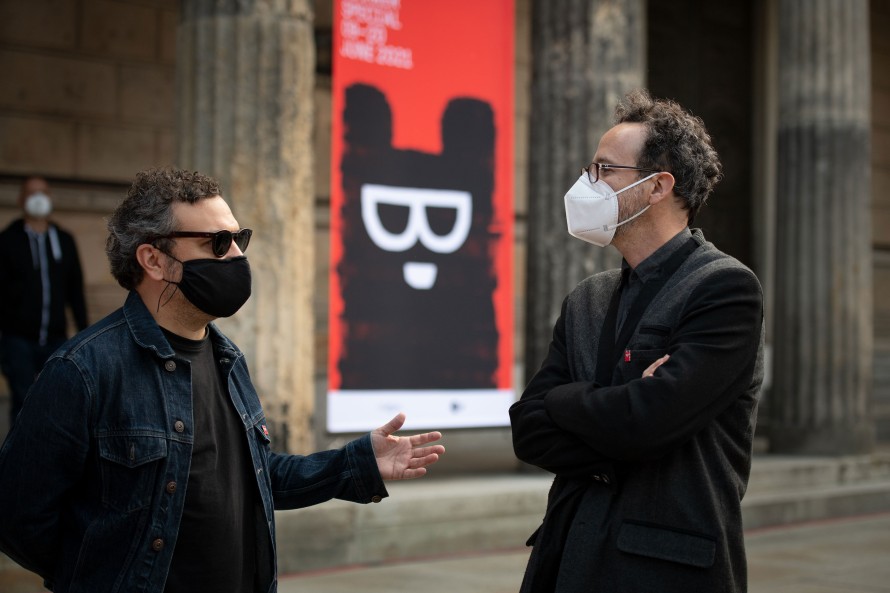
Director Alonso Ruizpalacios with Carlo Chatrian, Artistic Director of the Berlinale, at the Summer Special.
And yet, even at the end of the Summer Special, dark clouds were already forming in the blue sky over Berlin. The virus had changed, mutating into a delta variant that was more contagious and dangerous than its original form. A fourth wave was already predicted for the autumn. And what Covid-19 and its ramnifications had done to the cinema would only become apparent over time. The same was true of a society that appeared wounded and drained after a year of opening and closing, hoping and waiting. The world of work had changed during the year of the pandemic. Those who had the privilege worked from home, business trips were replaced by video conferences – also with an eye to the sustainability of one’s own behaviour in the face of a dying planet. In the winter there was a lot of discussion about the future of film festivals, always linked to the question of whether hybrid or purely digital events might ultimately prevail – even without the pressure of a pandemic. When the cinemas were allowed to reopen normally in July 2021, the commentators were mainly concerned about whether audiences would return to them after a year of being conditioned to streaming. At the end of an extraordinary year, much uncertainty remained, but also a great deal of hope that the Berlinale Summer Special marked a sustainable start to the return of the communal cinema experience. In any case, the festival’s dates for 2022 were again set for its traditional slot in February.
Facts & Figures of the Berlinale
Industry Event & Summer Special
| Films | ||
|---|---|---|
| Number of films in the Festival Selection | 170 | |
| Industry Event | Summer Special | |
| Number of films of the Festival Selection shown at the Online EFM | 139 | |
| Number of films in the public programme during the Summer Special | 130 | |
| Screenings | ||
| Total amount of screenings during the Summer Special | 194 | |
| Visitors | ||
| Total amount of theater visits during the Summer Special | 60.410 | |
| Tickets sold during the Summer Special | 57.962 | |
| Press | ||
| Journalists | 1.177 | 447 |
| Countries of origin | 70 | 21 |
| European Film Market | ||
| Film industry participants (with Online Market Badge) | 7.999 | |
| Countries of origin | 131 | |
| Number of films | 821 | |
| Number of online screenings | 1.452 | |
| virtual booths | 264 | |
| Number of exhibitors | 504 | |
| Berlinale Co-Production Market | ||
| Participants | 593 (plus 125 Visitor Producers) |
|
| Countries of origin | 64 | |
| Berlinale Talents | ||
| Participants | 204 | |
| Countries of origin | 65 | |
| Annual budget | €21.1 million | |
| The Berlin International Film Festival receives €10.2 million in institutional funding from the Federal Government Commissioner for Culture and the Media. In addition, it receives funding from the NEUSTART KULTUR programme of the Federal Government Commissioner for Culture and the Media. | ||
Gender Evaluation 2021
As in previous years the Berlinale has published a comprehensive gender evaluation (2.2 MB) of the programme, committees and management positions.